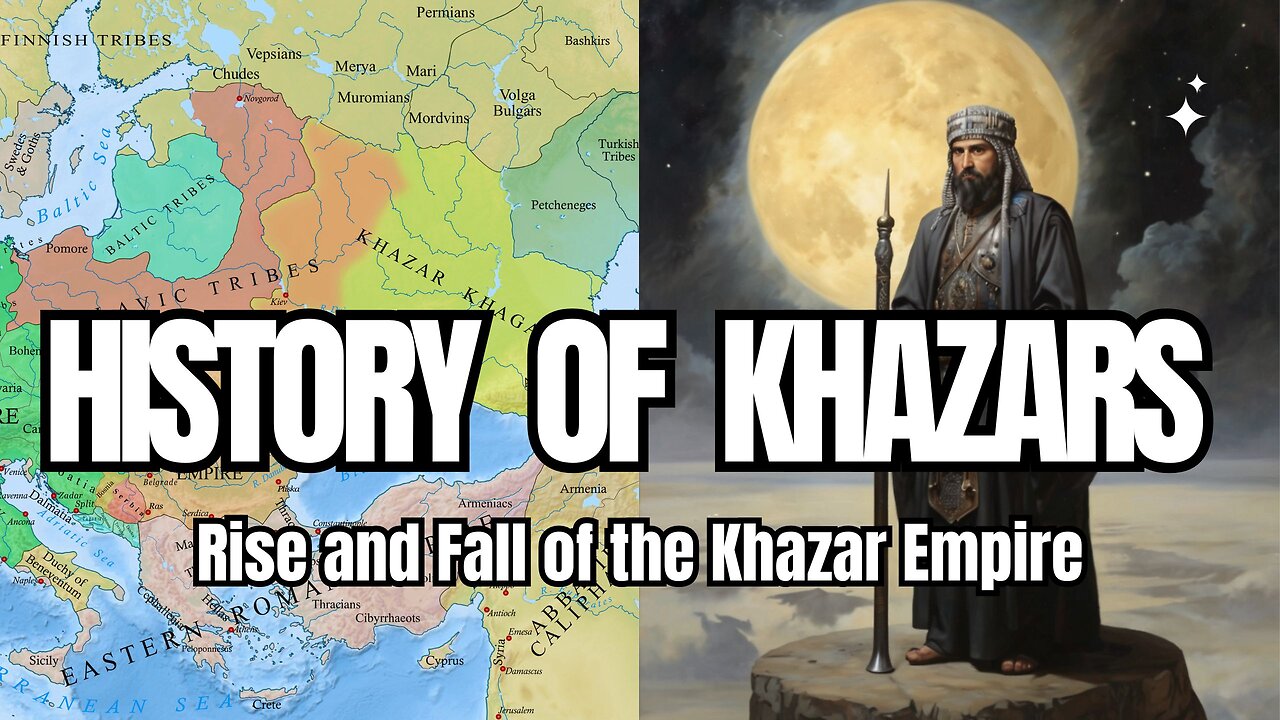Premium Only Content

History of the Khazars: Rise and Fall of the Khazar Empire
The Khazars were a semi-nomadic Turkic people who built a powerful empire in Eastern Europe between the 7th and 10th centuries. Known for their strong military, trade networks, and unique culture, the Khazar Empire played a crucial role in the region's history.
The Rise of the Khazar Empire
The Khazars emerged in the early 7th century, living in the steppes north of the Caspian and Black Seas. They were known for their skilled horsemanship and warrior culture. Initially part of the Western Turkic Khaganate, the Khazars gained independence as the Khaganate weakened, establishing their own distinct identity and political structure.
Expansion and Conquest
Under strong leaders, the Khazars rapidly expanded their territory. By the mid-7th century, the Khazar Empire stretched from the Caucasus Mountains to the Volga River, controlling key trade routes and amassing great wealth and power. Their expansion was facilitated by strategic military campaigns and diplomatic marriages, which helped consolidate their power and influence across a vast region.
Trade and Economy
The Khazar Empire's strategic location made it a crucial hub for trade between the East and West. They controlled the Silk Road routes, facilitating the exchange of goods such as silk, spices, and precious metals. The Volga River and the Caspian Sea were vital waterways that enhanced their trade capabilities, connecting them with the Islamic world, Byzantine Empire, and other regions.
Economic Prosperity
Trade brought immense wealth to the Khazars. Their capital, Itil, became a major commercial center, bustling with merchants and traders from various cultures. The Khazars minted their own coins, solidifying their economic power and influence. Their economic prosperity was also supported by a taxation system that levied duties on goods passing through their territory, further enriching the empire.
Conversion to Judaism
In the 8th century, the ruling class of the Khazar Empire converted to Judaism. This unique decision helped the Khazars maintain independence from both the Christian Byzantine Empire and the Muslim Caliphate. The conversion to Judaism, while primarily an elite phenomenon, had significant political and cultural implications, setting the Khazars apart from their powerful neighbors and providing a unifying identity for the ruling class.
Military Strength
The Khazars had a powerful and well-organized military. Their feared cavalry employed a combination of nomadic tactics and siege warfare, playing a crucial role in defending the empire's borders and maintaining its dominance. The Khazar military was also adept at fortification and constructing defensive structures, which helped protect their key cities and trade routes.
Alliances and Conflicts
The Khazars formed alliances with neighboring powers when it suited their interests. They were involved in numerous conflicts with the Byzantine Empire and the Arab Caliphate, often playing these rivals against each other to maintain their strength. The Khazars' strategic diplomacy and military prowess allowed them to navigate the complex political landscape of the region, securing their position and influence.
The Fall of the Khazar Empire
By the late 9th century, the Khazar Empire began to decline due to internal strife, economic challenges, and increasing pressure from neighboring powers. The central authority weakened as internal conflicts and succession disputes eroded the cohesion of the empire. Economic strain from over-reliance on trade and external pressures further destabilized the Khazar state.
Rus Invasions
Tensions between the Khazars and the Rus had been escalating due to competing interests and the strategic importance of trade routes controlled by the Khazars. The Khazars' decline, marked by internal strife and economic challenges, presented an opportunity for the Rus to assert their dominance in the region. In the late 10th century, the emerging Rus state launched devastating attacks on Khazar territories. The Rus, under the leadership of Sviatoslav I of Kiev, captured the capital, Itil, and dealt a critical blow to the Khazar Empire. These invasions crippled the Khazars' power and marked the beginning of their irreversible decline.
End of the Empire
By the early 11th century, the Khazar Empire had disintegrated. The remaining Khazars either assimilated into other cultures or were absorbed by neighboring states. The once-mighty empire faded into history, leaving behind a legacy of cultural diversity and strategic importance in the medieval world.
The history of the Khazars is a story of rise and fall, marked by remarkable achievements in trade, culture, and military prowess. Their empire played a crucial role in Eastern European history, serving as a bridge between different civilizations. The legacy of the Khazars lives on, reminding us of a time when a diverse and powerful empire thrived on the steppes of Eurasia. The Khazar Empire's unique blend of cultural tolerance, economic innovation, and military strength offers valuable insights into the complexities of medieval history and the dynamics of empires.
-
 8:44
8:44
RTT: Guns & Gear
22 hours ago $5.13 earnedStreamlight TLR RM2 Laser - G | The Best PCC Light
51.8K5 -
 36:38
36:38
Athlete & Artist Show
1 month ago $3.11 earnedNCAA Hockey Was A Joke, TNT Hockey Panel Is The Best In Sports
40.5K2 -
 1:00:08
1:00:08
Trumpet Daily
1 day ago $5.93 earnedBanning Mystery of the Ages - Trumpet Daily | Jan. 17, 2025
27K36 -
 15:10
15:10
Chris From The 740
1 day ago $3.49 earnedEAA Girsan Disruptor X 500-Round Review: Is It Reliable?
43.8K4 -
 1:00:38
1:00:38
PMG
19 hours ago $6.08 earnedCarnivore & Dr. Shawn Baker - Health Starts With Food
58.2K7 -
 1:28:13
1:28:13
Kim Iversen
20 hours agoCancelled Chef Pete Evans Exposes The One Change That Could End Big Food and Pharma
119K99 -
 4:20:21
4:20:21
Nerdrotic
22 hours ago $88.26 earnedDaradevil Born Again, Comics Industry CRASH, Neu-Hollywood REBUILD | Friday Night Tights #337
268K70 -
 1:32:34
1:32:34
Glenn Greenwald
18 hours agoThe Future of Gaza With Abubaker Abed; Journalist Sam Husseini On His Physical Expulsion From Blinken’s Briefing & Biden’s Gaza Legacy | System Update #391
146K107 -
 1:34:48
1:34:48
Roseanne Barr
20 hours ago $30.23 earnedWe are so F*cking Punk Rock! with Drea de Matteo | The Roseanne Barr Podcast #83
112K97 -
 1:08:20
1:08:20
Man in America
21 hours ago🇨🇳 RedNote: A CCP Trojan Horse Deceiving Americans? w/ Levi Browde
64.9K95